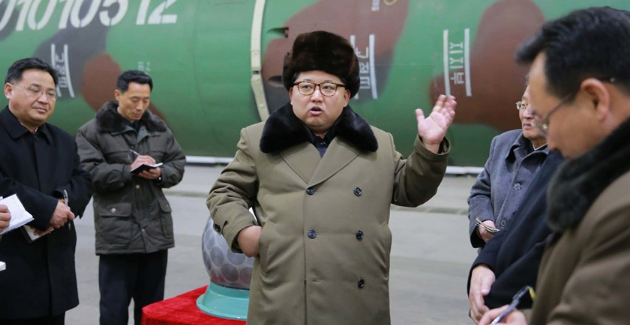China's Great Power Play for a Pyongyang Solution

China’s influence in North Korea has waned, but Beijing remains the only player capable of bringing together all sides to resolve the crisis on the Korean Peninsula. In doing so, China can bolster its reputation as a great power.
As the North Korean crisis continues, all eyes are once again back on China. No other country seems to have the expertise or influence to deal effectively with Pyongyang. However, North Korea’s leader, Kim Jong Un, is clearly not keen to discuss, let alone compromise on, anything. Kim Jong Un has responded to increased tensions by stiffening his rhetoric against countries North Korea claims to be “blindly and zealously toeing the US line”, going as far as to threaten Canberra with a nuclear strike. He seems not to care that his approach is turning more countries strongly against his regime.
The irony is that, until a couple of weeks ago, any consideration of how China could stop North Korea’s nuclear program was accompanied by scepticism. We have been reading for months that Beijing is doing too little to force Kim to respect the status quo. Even Donald Trump, after his meeting with President Xi Jinping at Mar-a-Lago in April, admitted that he now realised that China lacks the ability to guide Pyongyang’s choices, no matter how strictly China enforces international sanctions against North Korea or keeps track of refugee movements at the border.
If China retained the same relationship with Kim Jong Un that it had with his father, Kim Jong Il, we would not be at this point. The Chinese and North Korean leaders would have met; they would have spoken to each other; they would have clarified their interests and priorities in their conversations; and their privileged communication channel would have remained open. Though dialogue itself does not promote peace, it can certainly help to avoid dangerous and unnecessary escalation.
While its special relationship with China has decayed, North Korea is seemingly looking to consolidate other relationships. Regional frictions are many, and Pyongyang can nurture them to secure geopolitical advantages for itself. There are scholars talking about a new honeymoon for North Korea and Iran, with the two countries working on nuclear weapons development together, or perhaps Russia, aiming at reducing China’s leverage in the region. The famous Indian observer Professor Swaran Singh argues that Kim Jong Un has significantly improved his links with Pakistan, a country that could become a dangerous conduit for sharing North Koran nuclear and chemical weapon capacities and skills with terrorist movements such as ISIS.
It is difficult to dismiss the fact that Kim Jong Nam was assassinated with VX, a nerve agent and weapon of mass destruction that was once only available in America and Russia, although it is now apparent that North Korea can produce VX domestically. This of great concern to China; a strategically autonomous North Korea could become unmanageable for Beijing.
While this might suggest that China plays only a marginal role on the Korean chessboard, it is nonetheless the only power that can interact with all the countries involved. Trump’s initial go-it-alone strategy has failed, with the US subject to mockery after Trump claimed he was sending an “armada” to North Korea shortly before the armada was seen heading in the opposite direction. Xi Jinping is the only leader capable of unlocking the situation.
The Chinese leadership has an interest in avoiding further escalation of the North Korean crisis. And while Beijing’s main goal is to keep the status quo in Northeast Asia, it would be short-sighted not to see the huge boost to China’s prestige that the settlement of the North Korean nuclear issue could provide. Yet we cannot expect these two countries to negotiate a way out of the current impasse.
From an economic perspective, North Korea cannot survive without China’s help. Pyongyang knows well that war would be suicidal. However, the risk is that never-ending provocations will ready the conflict to explode, with one stupid incident or another accidentally transforming the nuclear rhetoric into reality. That is what China must avoid.
How? By promoting secret bilateral dialogue today and multilateral dialogue tomorrow. This will, of course, be challenging. First, Beijing needs to understand that painful concessions will be required on each side, otherwise the impasse cannot be overcome. Second, considering that China’s previous attempts to directly engage the North Korean leader have failed, Xi Jinping cannot risk a dangerous loss of face in trying to arrange a meeting with Kim Jong Un.
While it is easy to agree that keeping North Korea isolated is the key to limiting North Korea’s ambitions, since nuclear war represents the worst possible scenario for everyone, it is time to accommodate regional interests to find a realistic exit strategy. However, the wide range of sensitive issues at stake are making it harder to decide which country is in the best position to relaunch dialogue on the Peninsula.
Donald Trump has decided to take the lead in showing that a compromise is possible. The US has succeeded in opening frank conversations on the North Korean crisis with all countries in the region, Russia included. Beyond that, by declaring his interest in meeting with Kim Jong Un, Donald Trump achieved three different results in one shot. First, he is flattering Kim Jong Un with a once-in-a-lifetime opportunity to meet the new US president, an offer that the narcissistic leader may not be able to resist. The Korean Propaganda Department is probably looking forward to informing the country that the global leaders Trump and Kim are about to meet. Second, Trump is indirectly saving China from another possible loss of face. If, in the middle of a crisis, Xi Jinping failed again to engage Kim Jong Un directly, Xi’s national and regional prestige will be seriously compromised. Third, Trump’s successful consultations with South Korea, Japan, China and Russia will be a good argument to prove to Kim Jong Un that the region is less divided on the issue than it might otherwise appear.
Although Trump has made a step to de-escalate the crisis, the current deadlock will not be solved without China’s contribution. If Beijing is behind Washington’s move to engage all former Six-Party Talks members, we should all thank Xi Jinping for convincing Donald Trump to be less arrogant and more pragmatic in the region.
It is now up to China to show that the region is converging towards the common aim of neutralising North Korea. One way to achieve that would be to change its rhetoric on the THAAD missile shield and stop blaming South Korea for trying to defend itself against the nuclear threat that even China now describes as real and urgent. By doing so, China can avoid nuclear war while proving itself a great power and acquiring significant leverage in future negotiations. Unfortunately, Beijing is doing the opposite. Let’s hope that the new demand for an immediate halt to the THAAD missile system is not a precondition for talks but rather a reminder to the US that, once the North Korean crisis is over, the region must return to its pre-THAAD status quo.
Dr Claudia Astarita is a fellow at the Asia Institute at the University of Melbourne and a South Asia analyst at the Centre for Military and Strategic Studies in Rome. Claudia took part in the recent Korea Oceania Next Generation Policy Expert Forum held by the Australian Institute of International Affairs in cooperation with the Korea Foundation.
This article is published under a Creative Commons Licence and may be republished with attribution.





